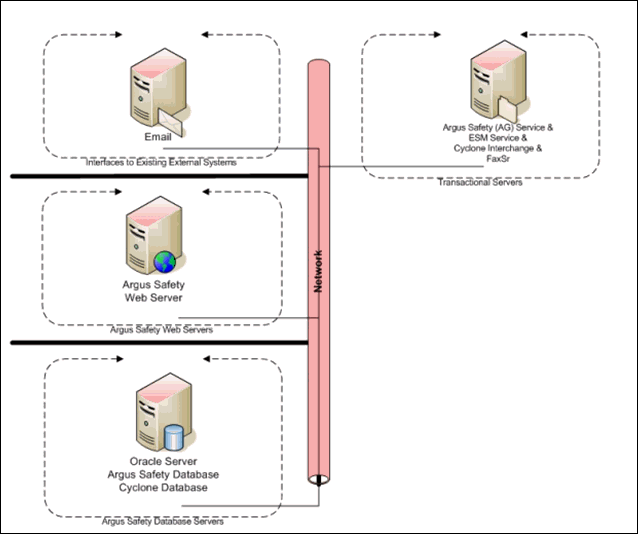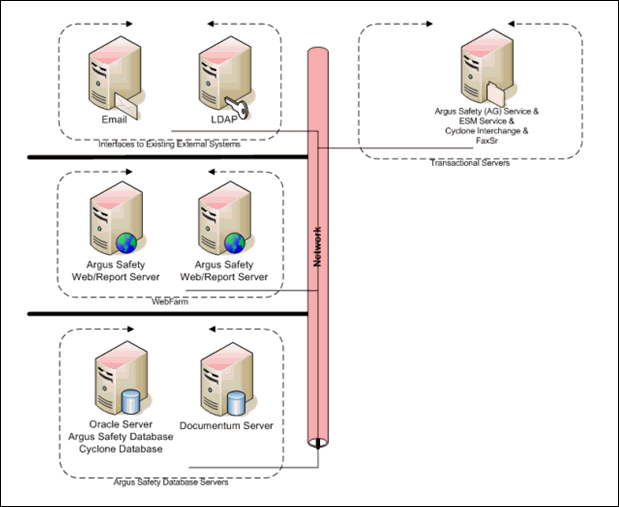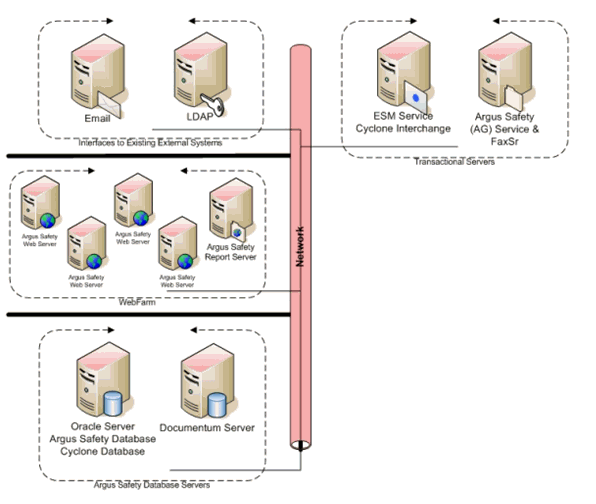| Oracle® Argus Safety Installation Guide Release 8.1 E71757-01 |
|
 Previous |
 Next |
This section includes the following information:
This section contains table that show the software installation requirements for small, mid-sized, and large companies for the following:
Argus Safety Database Server
|
Note: Argus Safety 8.1 both Standard and Enterprise Editions support the CDB/PDB as well as Non-CDB database formats of the Oracle Database 12.1.0.2. |
Argus Safety Web Server
|
Note:
|
Argus Transaction Server
|
Note: We do not recommend that AG/ESM Service runs on the Web Server, because the agproc.exe and argusvr2.exe services might conflict with each other when running together. |
Argus Interchange Server
The Argus Interchange Server is an optional component meant to off-load Interchange Service from the Argus Transaction Server. Alternatively, Interchange Service can be installed on the Transaction Server itself.
Argus Safety Web Client
Argus End of Study Unblinding Tool
Argus Safety OBIEE/BI Publisher Server
The OBIEE/BIP Server installation is optional, and required only if Argus Safety Flexible Aggregate Reporting (FAR) through BI Publisher is enabled.
Argus 8.1 supports OBIEE/BI Publisher 12.2.1.
Refer to the OBIEE 12c Installation Guide for Hardware and Software requirements.
See Hardware Requirements for Argus Safety for hardware requirements.
When installing the pre-requisites for the servers, the following order should be followed for installing each component. Depending on the server being installed, some of the pre-requisites may not be needed and can be skipped. After these are installed, you can install the rest of the pre-requisites (if any are needed) in any order prior to installing Argus.
Windows Operating System
Internet Information Services
Microsoft .NET Framework
Oracle Client 12.1.0.2 (32-bit)
Oracle ODP.NET
|
Note: If you install Windows and run Windows Updates without installing IIS first, Microsoft.NET will be installed first without correctly setting up ASP.NET. In the event this occurs where IIS is installed after Microsoft .NET, refer to Microsoft Support on how to re-register ASP.NET in IIS.This is usually accomplished by running aspnet_regiis.exe -i from the.NET V2.0.50727 folder. 1) Manually modify Machine.config Path: ”%windir%\Microsoft.NET\Framework\v2.0.50727\CONFIG To modify the default .NET Transaction Scope time, the following change should be made in the configuration file: </system.serviceModel> <system.transactions> <machineSettings maxTimeout="01:00:00" /> </system.transactions> </configuration> The value specified in maxTimeout is applicable for all Argus servers. |
The following table show the software installation requirements for small, mid-sized, and large companies:
| Software Requirements | Argus Safety Database Server | Argus Safety Web Server | Argus Transaction Server | Argus Interchange Server | Argus Safety Web Client | Argus End of Study Unblinding Tool (EOSU) + Schema Creation Tool ** + Interchange Mapping Tool |
|---|---|---|---|---|---|---|
| OPERATING SYSTEM | ||||||
| Microsoft Windows 2012 Standard | Yes | Yes | Yes | Yes | Yes | |
| Microsoft Windows 2012 R2 Standard | Yes | Yes | Yes | Yes | Yes | |
| Windows Client Machines and Internet Explorer | ||||||
| Microsoft Windows 7 (32/64-bit) | Yes | Yes | ||||
| Microsoft Windows 8.1 (32/64-bit) | Yes | Yes | ||||
| Microsoft Windows 10 (32/64-bit)** | Yes | Yes | ||||
| Microsoft Internet Explorer, Version 11.0 (32/64-bit) | Yes | |||||
| ORACLE DATABASE SERVER
(Enterprise/Standard over CDB/PDB or non-CDB format) |
||||||
| Microsoft Windows 2012 Standard | Yes | |||||
| Microsoft Windows 2012 R2 Standard | Yes | |||||
| Oracle Linux 6.7/7.1 | Yes | |||||
| Oracle RAC | Yes | |||||
| Sun Solaris 10/11 | Yes | |||||
| Other Oracle Database Components | ||||||
| Oracle Advanced Security Transparent Data Encryption (TDE)*** | Optional | |||||
| Oracle Advanced Security Network Encryption | Optional | |||||
| ORACLE CLIENT | ||||||
| Oracle 12c Release 1 Client 12.1.0.2 (32-bit only), Oracle Call Interface, ODAC, MTS, ODP.NET | Yes | Yes | Yes | Yes | ||
| OTHER MANDATORY SOFTWARE'S | ||||||
| Microsoft Visual C++ 2005 SP1 Redistributable Package MFC Security Update (32 bit) | Yes | Yes | Yes | Yes | ||
| Microsoft Visual C++ 2012 Runtime | Yes | Yes | Yes | Yes | ||
| Microsoft Visual Basic Power Packs 10.0 | Required for Interchange Mapping Tool | |||||
| Microsoft .NET 3.5 SP1 Framework | Yes | Yes | Yes | Yes | ||
| Microsoft Word + Excel 2010/2013 (64-bit) | Required for Dossier only | Yes | Yes | Yes | Required for Schema Creation MedDRA Recode and End of Study only | |
| Adobe Acrobat Reader DC/XI with East Asian Fonts | Yes | |||||
| OPTIONAL SOFTWARE | ||||||
| Documentum DFC 7.2/6.7 SP2 (64-bit) | Yes | Yes | Yes | |||
| RightFax 10.5/10.6 -Required files only | Yes | |||||
| OPTIONAL SUPPORTED FEATURES | ||||||
| Oracle Components | ||||||
| Oracle Identity Manager (OIM) 11.1.2.2 - WebGate 10.1.4.3 (32-bit only) | Required only for Single Sign-On integration with Oracle Identity Manager. | |||||
| Oracle WebCenter - 11g (11.1.1.7) | Required only for multi-tenant installations
(Optional - Required only to deploy the Global Application module. Ideally, the WebCenter Portal Server should be deployed on a separate Web Server. Alternatively, the Global Application module can also be deployed on Argus Safety Web Server directly). |
|||||
| Reporting Solutions | ||||||
| Oracle Business Intelligence Enterprise Edition (OBIEE) 12.2.1 | Yes^ | |||||
| Oracle BI Publisher 12.2.1 | Yes^
(For Argus SE only) |
Yes | ||||
| Third Party Integrations | ||||||
| LDAP/LDAPS Protocol Version 3.0 | LDAP authentication support | |||||
| SMTP Protocol | E-mail support | |||||
| Documentum DFC, Version 6.7 SP2 (64-bit), or 7.2 | Required only when Documentum is used for Storage. | |||||
| RightFax 10.5/10.6 | Required only for faxing Expedited Reports. | |||||
| Gateway for E2B Reporting | ||||||
| Oracle B2B - 12.2.1 | Certified with both AS1 and AS2 protocols for E2B exchanges between regulatory authorities and pharmaceutical companies. | |||||
| Axway Interchange 5.12 SP8 (64-bit) | Required for E2B Report Exchange. | |||||
|
* Note: * Database Instance is required to be AL32UTF8 Character Set. ** Refer to Note 1 for Oracle Client Patch required for Schema Creation Tool. *** Refer to Note 2 for Oracle Database TDE feature. ^ Refer to Note 3 for WebLogic 12.2.1 patch details. |
|
** Note 1: Oracle Client Patch required for the Schema Creation ToolDownload the patch 19720843: WINDOWS DB BUNDLE PATCH 12.1.0.2.1 through Oracle Support. Apply the following workaround after successfully installing this patch:
|
|
*** Note 2: Oracle Database TDE feature is part of the Oracle Advanced Security option available for Oracle Database Enterprise Edition 12c (https://docs.oracle.com/database/121/ASOAG/asotrans_config.htm#ASOAG10275, orhttp://www.oracle.com/technetwork/database/options/advanced-security/index-099011.html). TDE provides the capability to encrypt sensitive data in the Oracle Database in a manner that is transparent to applications. Argus Safety product has been functionally certified with tablespace level encryption using the Oracle Database TDE feature. |
|
^ Note 3: For Argus Safety Web Server, you need Oracle Business Intelligence Enterprise Edition (OBIEE) 12.2.1 + Patch 22248372 for CVE-2015-4852 for WebLogic 12.2.1 |
This section provides information about the recommended hardware topology and hardware requirements for small, mid-size, and large companies.
The size of your company and licensed Argus components determines the distribution of the software among the servers.
The following are the definitions for small, mid-sized, and large companies.
Small Company: A small company is a company that has from 1 to 50 concurrent users and fewer than 200 new cases reported each month.
Mid-Sized Company: A mid-sized company is a company with 51 to 100 concurrent users and 300 to 600 new cases reported each month.
Large Company: A large company is a company with more than 100 concurrent users and approximately 1000 to 5000 new cases reported each month.
The following image shows the recommended hardware topology for the Argus Safety Hardware for a small company.

The following image shows the recommended topology for the Argus Safety Hardware for a mid-sized company.

The following is an illustration of the recommended topology for a large company.

The following table show the hardware requirements for Argus Safety installation for small, mid-sized, and large companies:
| Hardware Requirements | Argus Safety Database Server | Argus Safety Web Server | Argus Transaction Server | Argus Interchange Server | Argus Safety Web Client | Argus End of Study Unblinding Tool (EOSU) | |||||||||
|---|---|---|---|---|---|---|---|---|---|---|---|---|---|---|---|
| Small | Mid-Size | Large | Very Large | Small | Mid-Sized | Large | Small | Mid-Sized | Large | Small | Mid-Sized | Large | |||
| RAM | |||||||||||||||
| 2 GB | Yes | ||||||||||||||
| 4 GB | Yes | Yes | Yes | Yes | Yes | Yes | Yes | Yes | Yes | Yes | |||||
| 4 - 8 GB | Yes | ||||||||||||||
| 8 - 16 GB | Yes | ||||||||||||||
| 16 - 32 GB | Yes | Yes | |||||||||||||
| CPU/Processor | |||||||||||||||
| 1 Dual Core CPU X 3 GHz | Yes | Yes | Yes | Yes | |||||||||||
| 2 Dual Core CPUs X 3 GHz | Yes | Yes | Yes | Yes | Yes | Yes | |||||||||
| Equivalent to 2 - 4 Dual Core X 3GHz | Yes | ||||||||||||||
| Equivalent to 4 - 8 Dual Core X 3GHz | Yes | ||||||||||||||
| Equivalent to 16 Dual Core X 3GHz | Yes | Yes | |||||||||||||
| Pentium IV X 3 GHz | Yes | ||||||||||||||
| Fail Support Platform | |||||||||||||||
| Dataguard (physical standby option) | Yes | ||||||||||||||
| Virtualization | |||||||||||||||
| Physical Server | Yes | Yes | Yes | ||||||||||||
| Oracle Virtual Machine (OVM 3.2.10, 64-bit) | Optional | Yes | Yes | Yes | |||||||||||
| Others | |||||||||||||||
| Exadata 12c R1 (with 12.1.0.2) | Optional | ||||||||||||||
| Oracle RAC 12c R1 (with 12.1.0.2) | Optional | ||||||||||||||
| Minimum Resolution | 1280X1024 | 1280X1024 | 1280X1024 | 1280X1024 | 1280X1024 | ||||||||||
Before installing the Argus Safety software, be sure to do the following:
Set the resolution for the client workstation to a minimum of 1280 X 1024 for optimum viewing of the application. If the screen resolution is less than 1280 X 1024, some of the field labels may appear truncated.
Make sure that the regional settings on the web server are American settings.
Install East Asian languages on the following:
Argus Web Server
Argus Service Server
Interchange Transaction Server
Argus Web client machines
Install the Japanese font pack for Adobe Reader on the Argus Web client machines. If you fail to install this font pack, you will be unable to view the Japanese data correctly.
The following is the recommended order for installing the Argus Safety solution components:
Install the Schema Creation Tool
Create/Upgrade Argus Safety Database Schema
Load the Factory Data
Execute the Argus Safety Database Schema Validation
Install the Argus Safety Web Component
Load MedDRA
Load WHO-Drug
Load J Drug (if you are using Argus J)
Install the Argus Safety Services / Interchange Service / Interchange Mapping
Configure the Argus Safety Service
Configure the Interchange Service
Install and Configure Axway Synchrony
Maintain Installation
|
Note: In this release, merging of databases into a Multi-Tenant Database does not support merging of DLP data. |
Execute the following steps to convert Argus Safety Report Server to Argus Web Server:
Navigate to the Argus Safety Report Server.
Go to C:\Windows and open the argus.ini file.
Delete references to the ReportServerUser, ReportServerPassword and ReportServerPriority.
Update the entry for ReportServer to HTTP://Localhost